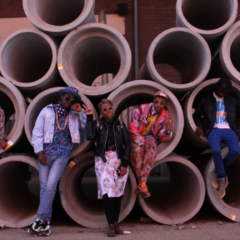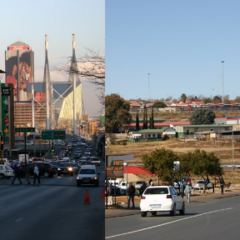Johannesburg
Johannesburg is one of the wealthiest and most socially developed cities in Sub-Saharan Africa. But it is also highly unequal economically, socially and racially. These inequalities take many everyday and structural forms in the city itself, as well as at the scale of the nation-state of South Africa. It is in this context, that The GendV Project approaches two specific sites of Alexandra and Sandton in Johannesburg to situate our study.
Alexandra or Alex is a poor township of Johannesburg with formal and informal settlements, and a long history of involvement in the anti-apartheid struggle. It is adjacent to the wealthy Sandton area which is also the main financial area of Johannesburg. This spatial separation is emblematic of post-apartheid South Africa, and offers an ideal opportunity to investigate our core research questions on gender and urban transformations.
Historically South African townships such as Alex did not get courts or police stations under Apartheid which has imparted a distinct legacy to how they are viewed by the population. Indeed, in Alex during police and army deployment during anti-migrant violence, residents in hostels (Apartheid-era male-only buildings that did not allow families to settle in Johannesburg) reported that raids felt like Apartheid-era violence. There are difficult relations with police and local councillors because of memories of Apartheid.
In contrast, Sandton is one of the wealthiest and most exclusive parts of the city. It houses the urban elites and has a well established and thriving commercial and retail infrastructure. Sandton also has a high concentration of private security services, including privatised weapons and security infrastructure, resulting in the form of a privatised urban Apartheid. The demographic of Sandton is also largely racially white, with some new black middle residents. Hence Sandton provides a sharp contrast to the adjoining township of Alex.
Through studying these two very different urban contexts in Johannesburg, The GendV Project approaches questions around urban transformations and gender at multiple scales of the urban sites themselves, as well as the city and nation-state more broadly.


